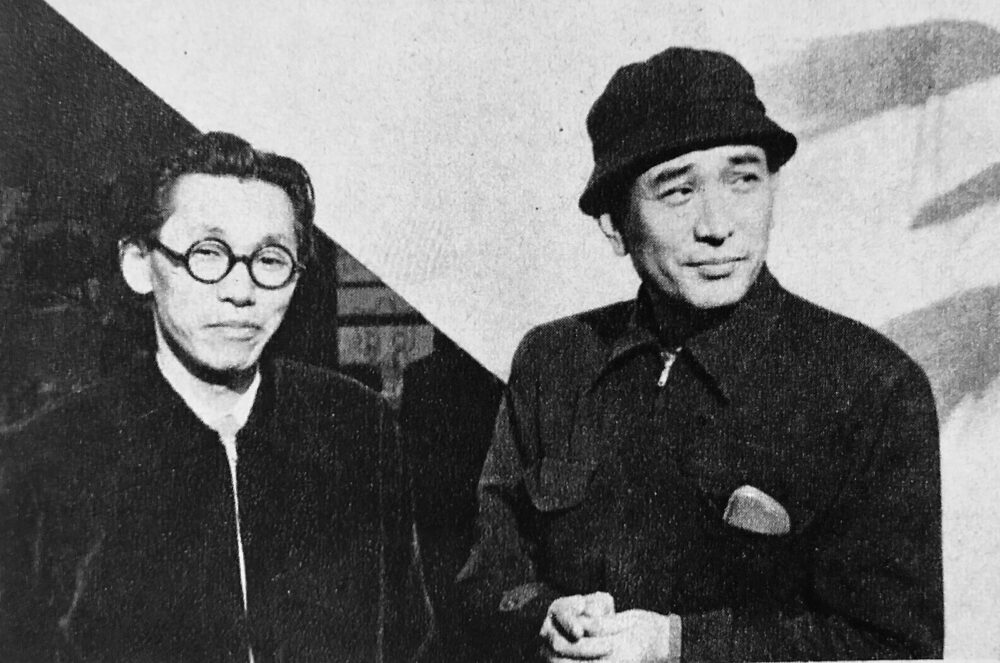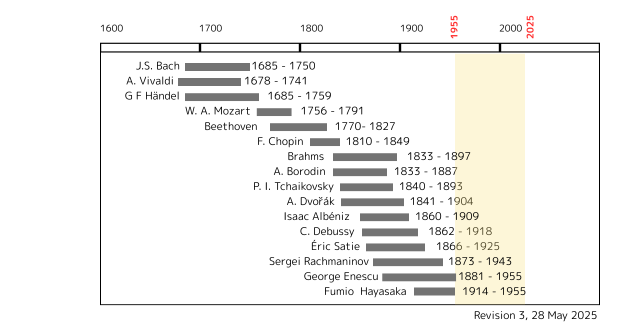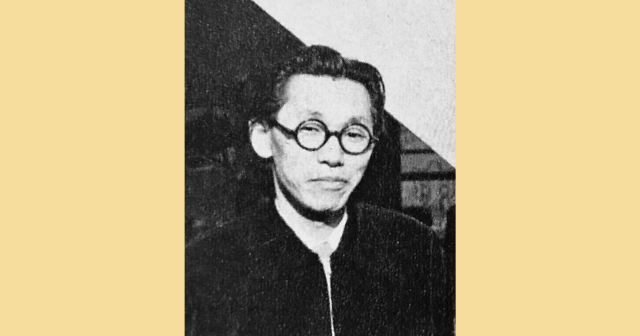Note : All graphics and photos in this post are copied from Wikipedia (both in English and Japanese version). They are all described as they are in public domain.
Seven Samurai (Japanese: 七人の侍, Hepburn: Shichinin no Samurai) is a 1954 Japanese epic samurai action film directed by Akira Kurosawa from a screenplay co-written with Shinobu Hashimoto and Hideo Oguni. Taking place in 1586, in the Sengoku period of Japanese history, it follows the story of a village of desperate farmers who seek to hire samurai to combat bandits who will return after the harvest to steal their crops.
『七人の侍』(しちにんのさむらい)は、1954年に公開された日本の時代劇映画である。監督は黒澤明、主演は三船敏郎と志村喬。日本の戦国時代の天正年間(劇中の台詞によると1586年)を舞台とし、野武士の略奪に悩む百姓に雇われた7人の侍が、身分差による軋轢を乗り越えながら協力して野武士の襲撃から村を守るという物語である。
Fumio Hayasaka, who was in charge of the music, was suffering from pulmonary tuberculosis. Despite his illness, he spent a year drafting the compositions while working on other projects in parallel. Hayasaka would play each of his accumulated pieces on the piano in front of Kurosawa, who would critique them. Based on Kurosawa’s feedback, Hayasaka revised the music and gradually shaped the outlines of the score.
The main theme, known as the “Samurai Theme,” is a bold, march-like piece. Initially, all of Hayasaka’s drafts for this theme were rejected. Then, as a last resort, he played a piece he had discarded in the trash. Kurosawa liked it and decided to use it for the film.

音楽を担当した早坂文雄は、当時肺結核を患っていたが、他の仕事と並行しながら1年かけてデッサンを書いた。早坂は書きためた曲を、黒澤の前で1曲ずつピアノで弾き、黒澤のダメ出しを受けながら修正して曲のアウトラインを決めた。
主題曲ともいえる「侍のテーマ」は勇壮なマーチ風である。この曲ははじめ早坂が用意したデッサンがすべて没案となり、そこで早坂がごみ箱に捨てていた楽譜をピアノで弾いたところ、黒澤が気に入り採用したものだった。
Transcription by author of this site, MooRock, and he reserves copy right.
Fumio Hayasaka (早坂 文雄 Hayasaka Fumio; August 19, 1914 – October 15, 1955) was a Japanese composer of classical music and film scores.
He had a celebrated association with the pre-eminent Japanese director Akira Kurosawa which was short-lived due to Hayasaka’s early death. The 1948 film Drunken Angel (Yoidore tenshi) was the first film directed by Akira Kurosawa that Hayasaka composed music for. The director and composer collaborated to test “oppositional handling of music and performance”. Their collaboration turned into a very deep artistic relationship, with Hayasaka contributing ideas to the visual part of the film. In his autobiography, Kurosawa would say that working with Hayasaka changed his views on how film music should be used; from then on, he viewed music as “counterpoint” to the image and not just an “accompaniment”. This is also the first film that Kurosawa used Toshiro Mifune as an actor.
Among the films Hayasaka scored for Kurosawa are Stray Dog (1949), Rashomon (1950), Ikiru (1952) and Seven Samurai (1954). During the 1950s, Hayasaka also composed the scores for some of the final works of another Japanese director, Kenji Mizoguchi. Hayasaka composed music for Ugetsu (1953), Sansho the Bailiff (1954), and The Crucified Lovers (1954).
早坂文雄(はやさか ふみお、1914年8月19日 – 1955年10月15日)は、日本のクラシック音楽および映画音楽の作曲家。
彼は日本を代表する映画監督・黒澤明との共同作業で知られているが、それは早坂の早すぎる死によって短命に終わった。1948年の映画『酔いどれ天使』は、黒澤明が監督し、早坂が音楽を担当した初の作品である。両者はこの作品で「音楽と演技の対置的な扱い方」を試みた。この協働はやがて非常に深い芸術的関係へと発展し、早坂は映像面にもアイデアを提供するようになった。黒澤は自伝の中で、早坂との仕事によって映画音楽の捉え方が変わったと語っており、それ以降、音楽は単なる「伴奏」ではなく、映像に対する「対位法」として捉えるようになったという。この作品はまた、黒澤が三船敏郎を初めて起用した映画でもある。
早坂が音楽を担当した黒澤作品には、『野良犬』(1949年)、『羅生門』(1950年)、『生きる』(1952年)、『七人の侍』(1954年)などがある。1950年代には、早坂はもう一人の日本の名監督・溝口健二の晩年の作品にも音楽を提供している。『雨月物語』(1953年)、『山椒大夫』(1954年)、『近松物語』(1954年)がそれにあたる。
Compositions of Hayasaka has influenced many of Japanese works of animation and entertainment movies featuring “kaiju (fictional creatures)” and super heroes.
早坂の作品は、その後の日本のアニメや怪獣映画、ヒーローを扱う娯楽番組に大きな影響を残した。


コメント